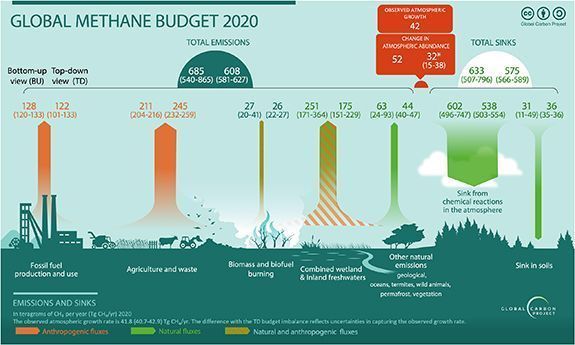In 2023, the concentration of methane in the atmosphere reached 1,923 parts per billion. This is 2.6 times more than in pre-industrial times, and the highest concentration in at least 800,000 years.
These data were published by the international coalition of scientists Global Carbon Project in the journal Earth System Science Data. This writes Euronews.
According to the study, over the past two decades, the number of anthropogenic sources of methane has increased by 20%. The researchers say that despite global efforts to reduce emissions, the number of methane sources is constantly growing and this is largely due to human activity. They warn that current dynamics threaten the Paris Agreement's global warming limit of 1.5 ° C.
Which countries produce the most methane?
The world's five largest polluters of the atmosphere with this greenhouse gas are China (16%), India (9%), the United States (7%), Brazil (6%) and Russia (5%).
Satellite data show that between 2020 and 2023, methane emissions increased by another 5%. The greatest growth was observed in China, South Asia and the Middle East. Emissions from coal mining in China and oil and gas production in the Middle East were major contributors.
"Only the European Union and possibly Australia have reduced methane emissions from human activity over the past two decades," said Mariel Sonois of the University of Paris-Saclay in France, lead author of the Earth System Science paper.
Why methane emissions are a problem
Methane is a very powerful greenhouse gas that does not last long in the atmosphere. It comes:
- from natural sources such as wetlands;
- from anthropogenic sources such as agriculture and the fossil fuel industry.
In the first 20 years after emission, this gas warms the atmosphere almost 90 times faster than CO2 carbon dioxide. Currently, there are no technologies capable of directly removing this gas from the atmosphere.
In the report, scientists note that agriculture, including livestock and rice fields, is still the largest source, accounting for 40% of global anthropogenic methane emissions. Fossil fuel extraction is 34%, waste processing is 19%, and biomass burning is 7%.

Source: iopscience.iop.org.
Emissions in these sectors have increased due to increased activity in developing regions and intensification of fossil fuel extraction.
But the researchers made an important change in their latest estimate of methane sources. Previously, they classified all emissions from wetlands, lakes, ponds and rivers as natural. The latest edition of the report attempts to quantify the impact of human activity on the growth of emissions from these sources.
Scientists estimate that about a third of methane emissions from wetlands and freshwater bodies in recent years have been caused by anthropogenic factors, including reservoirs and emissions increased by fertilizer runoff, sewage, land use and rising temperatures.
What are the predictions?
If current trends continue, the report's authors warn that countries are unlikely to meet the targets set out in the Global Methane Commitment.
The increase in emissions they see is consistent with the Intergovernmental Panel on Climate Change's most pessimistic greenhouse gas scenarios. This could mean a rise in global temperatures of more than 3°C compared to pre-industrial times by the end of the century.
In April, EcoPolitic reported that in 2023 the level of greenhouse gases in the air reached record indicators. The impact of methane on global temperature increase was then about 30%.





